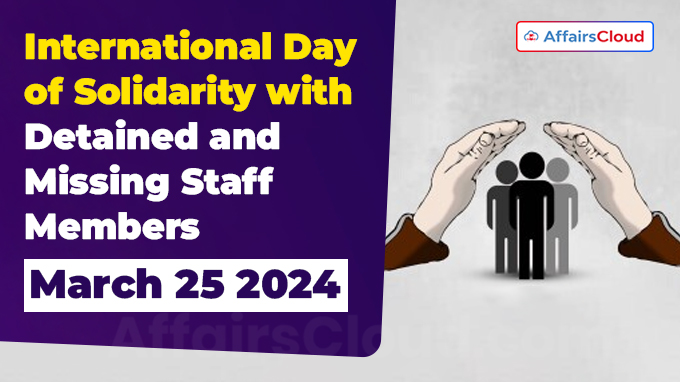 The United Nations (UN)’s International Day of Solidarity with Detained and Missing Staff Members is annually observed across the globe on 25 March to honour the courage and dedication of UN Staff members and medical and humanitarian workers everywhere.
The United Nations (UN)’s International Day of Solidarity with Detained and Missing Staff Members is annually observed across the globe on 25 March to honour the courage and dedication of UN Staff members and medical and humanitarian workers everywhere.
- The Day is a call to action to protect UN personnel and peacekeepers and recognises the risks faced by those working for the UN.
Purpose of the Day:
Every year the day is observed to mobilise action, demand justice, and strengthen our intention to protect UN staff and peacekeepers, as well as our colleagues in the non-governmental community and the press.
Origin:
i.The Day commemorates the anniversary of the abduction of Alec Collett, a British journalist, who was on an UN assignment covering refugee camps in Lebanon. He worked with UN Relief and Works Agency for Palestine Refugees in the Near East (UNRWA).
ii.In 1985, he was abducted by a gunman of the Palestinian Abu Nidal group in Lebanon.
iii.His body was finally found in Lebanon’s Bekaa Valley in 2009 by a joint team from the UN Department of Safety and Security (DSS) and British police.
Protecting UN Staff:
i.Since the inception of the UN in 1945, numerous UN personnel have sacrificed their lives in service.
ii.Heightened risks occurred during the 1990s due to expanded peacekeeping missions.
iii.More lives were lost during the peacekeeping missions in the 1990s compared to the previous 4 decades combined.
Note: Since 2022, 381 UN personnel have been detained, including 7 in January and February 2024. A total of 27 UN personnel remain in detention.
Efforts of the UN:
i.In September 1993, the UN Security Council (UNSC) adopted the 1st resolution S/RES/868(1993) in staff security.
ii.Negotiations took place in the 6th (Legal) Committee of the UN General Assembly (UNGA) on an international legal convention to protect UN personnel.
iii.The result of those negotiations led to the Convention on the Safety of UN and Associated Personnel, which was adopted by UNGA on 9 December 1994 and came into force in 1999.
Scope of the Convention:
i.Initially, the Convention covered UN operations aimed at maintaining or restoring international peace and security, or those deemed to pose an exceptional risk to personnel safety.
ii.However, non-peacekeeping operations were only covered under exceptional risk declarations.
Optional Protocol:
i.The UN implemented the Optional Protocol to the Convention on the Safety of UN and Associated Personnel in 2005, rectifying the deficiency of the Convention.
ii.It expands the legal protection to all other UN operations, from emergency humanitarian assistance to peacebuilding and the delivery of humanitarian, political, and development assistance.




